Mike Drop from 1886… Frederick Douglass Leaves Us All Stunned…
July 25, 2022 by Laura Heilenman · Leave a Comment
The phrase “mike drop” is a trendy phrase in 2022, however, none could hold a candle to Frederick Douglass‘ address to Congress in 1886/1887. The Atlantic Monthly from December 1886 & January 1887 carried his plea, and while I would like to have something to add to his words, I believe I’ll let a portion of his address speak for itself:
“The Principle of slavery, which [The Founding Fathers] tolerated under the erroneous impression that [slavery] would soon die out, became at last the dominant principle and power at the South. It early mastered the Constitution, became superior to the Union, and enthroned itself above the law. Freedom of speech and of the press it slowly but successfully banished from the South, dictated its own code of honor and manners to the nation, brandished the bludgeon and the bowie knife over Congressional debate, sapped the foundations of loyalty, dried up the springs of patriotism, blotted out the testimonies of the fathers against oppression, padlocked the pulpit, expelled liberty from its literature, invented nonsensical theories about master-races and slave-races of men, and in due season, produced a Rebellion fierce, foul, and bloody. This evil principle again seeks admission into our body politic. It comes now in shape of a denial of political rights to four million loyal colored people. The South does not now ask for slavery. It only asks for a large degraded caste, which shall have no political rights. This ends the case. Statesmen, beware what you do. The destiny of unborn and unnumbered generations is in your hands. Will you repeat the mistake of your fathers, who sinned ignorantly?”
Some may want to join me in picking our jaws up off of the floor as we stand in awe of a man who, as a former slave, (self) educated himself to such heights, ironically, using The Columbian Orator which was also used as a textbook by other familiar names: Ralph Waldo Emerson (philosopher/poet), Harriet Beecher Stowe (author of Uncle Tom’s Cabin), and Horace Greely (editor/publisher of the New York Tribune) to name a few.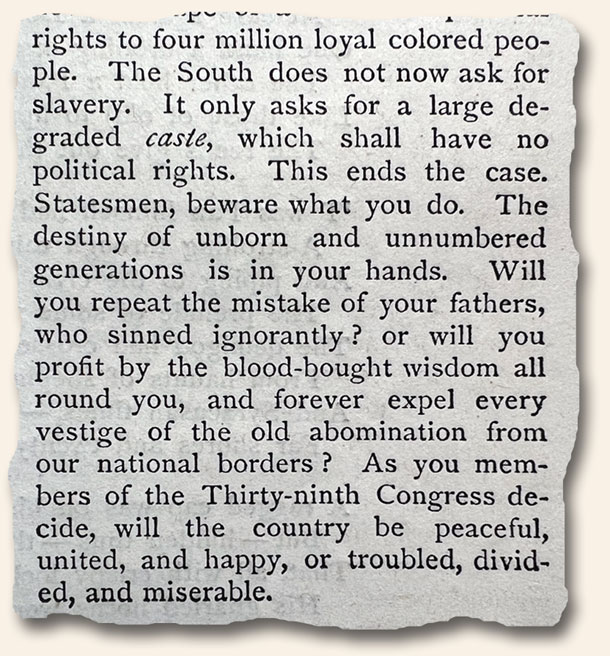
Juneteenth Revisited – “The rest of the story”…
June 27, 2022 by GuyHeilenman · Leave a Comment
 Roughly a week ago we were observing the most recent addition to our list of Federal Holidays: Juneteenth, which commemorates the day when Union troops marched into Galveston, Texas and Major General Gordon Granger informed the people of Texas that all enslaved people were now free. His General Order (No. 3) stated: “The people of Texas are informed that, in accordance with a proclamation from the Executive of the United States, all slaves are free…”. However, what is that at the end? Dot, dot, dot? There’s more?
Roughly a week ago we were observing the most recent addition to our list of Federal Holidays: Juneteenth, which commemorates the day when Union troops marched into Galveston, Texas and Major General Gordon Granger informed the people of Texas that all enslaved people were now free. His General Order (No. 3) stated: “The people of Texas are informed that, in accordance with a proclamation from the Executive of the United States, all slaves are free…”. However, what is that at the end? Dot, dot, dot? There’s more?
His full order reads as follows: “The people of Texas are informed that, in accordance with a proclamation from the Executive of the United States, all slaves are free. This involves an absolute equality of personal rights and rights of property between former masters and slaves, and the connection heretofore existing between them becomes that between employer and hired labor. The freedmen are advised to remain quietly at their present homes and work for wages. They are informed that they will not be allowed to collect at military posts and that they will not be supported in idleness either there or elsewhere.” In other words, “You are free, but if you think the government is going to support you if you leave your new ’employer’, think again.” For many, this would be analogous to someone who was bound, kidnapped, and being transported by airplane to some horrible location having their bindings removed and told they were welcome to leave any time they want (albeit, at 10,000 feet without a parachute). While this Order is quite historic, and the day does deserve to be celebrated, there is a whiff of Hotel California in the air: “You can check-out any time you like, but you can never leave!”
Am I exaggerating – misrepresenting the circumstances? One might think so, but an article I recently discovered within a July 16, 1865 issue of The New York Times which printed a follow-up Order by General Granger given approximately one week later begs to differ: 
Even when granted with good intentions, freedom needs to be embraced – and the “doing so” is often fraught with hardship. However, while the struggle continues, taking time to celebrate this momentous occasion (along with the many victories which have occurred since June 19, 1865) is worthy of our unified, citizen-wide efforts – regardless of our racial, social, political, religious or economic differences. The intrinsic hope of “We The People!” must ever be before us.
The Fight Against Slavery… 1822…
June 13, 2022 by GuyHeilenman · Leave a Comment
 If asked to name famous men and women who fought to free slaves and/or to bring an end to this horrible era in American history, most short-lists would likely include Frederick Douglass, Harriet Beecher Stowe, Sojourner Truth, Harriet Tubman, and John Brown, but many others were also sacrificially and emphatically committed to the cause who are relatively (if not completely) unknown. Such is the case of Telemaque, a free former slave who was executed for conspiracy. If you are from Charleston, SC, you likely know his name long with a handful of his accomplishments; however, the remainder of us would do well to learn more about him: Telemaque (Denmark Vessey)
If asked to name famous men and women who fought to free slaves and/or to bring an end to this horrible era in American history, most short-lists would likely include Frederick Douglass, Harriet Beecher Stowe, Sojourner Truth, Harriet Tubman, and John Brown, but many others were also sacrificially and emphatically committed to the cause who are relatively (if not completely) unknown. Such is the case of Telemaque, a free former slave who was executed for conspiracy. If you are from Charleston, SC, you likely know his name long with a handful of his accomplishments; however, the remainder of us would do well to learn more about him: Telemaque (Denmark Vessey)
A woodcut masthead is worth a thousand words… Slavery…
May 16, 2022 by GuyHeilenman · Leave a Comment
A few weeks back my favorite person posted: Take a Closer Look … The Delicate Details of Woodcut Prints…
Such prints are truly amazing. However, as is the case with (most?) works of art, to some degree they tell a story. One such story is that of “Slavery – The Cry for Emancipation”, as told through the masthead of The Liberator. While we have many historic newspapers containing articles chronicling the path from the horrors of slavery, through emancipation, then on to suffrage and beyond, few rival what is communicated through this most-amazing, intricate, illustration which was present at the top of nearly every issue. At a distance its beauty speaks to the eyes, but a close-up view shouts to the heart: ENOUGH!
See for yourself:

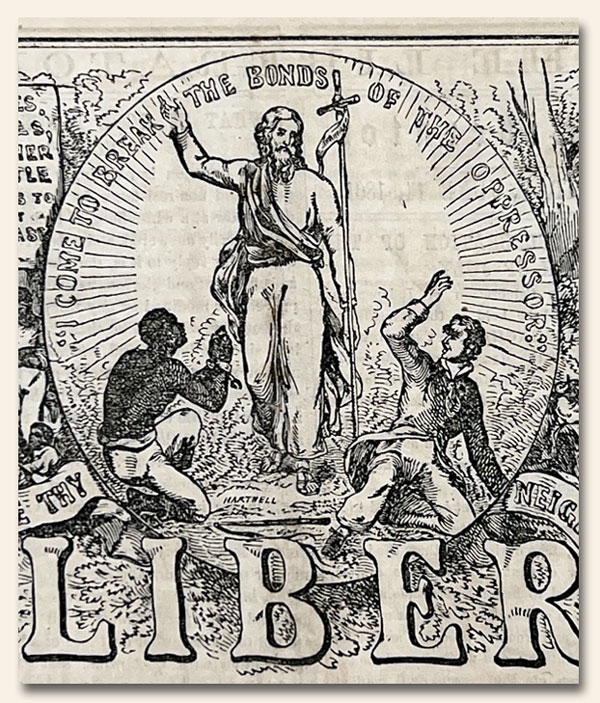
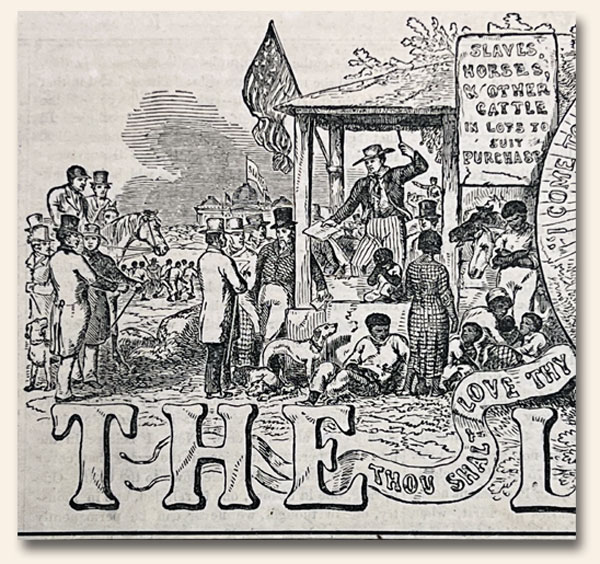
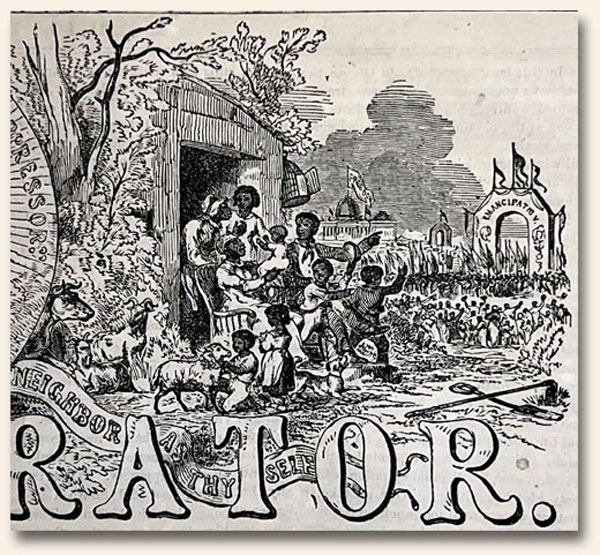
Snapshot 1879 – A former slave’s trek from bondage to bounty…
January 24, 2022 by Laura Heilenman · Leave a Comment
As I was reading interesting articles regarding Mormons, Frederick Douglass, and other news of the day in a January 19, 1879 issue of The New York Times, a somewhat nondescript heading caught my attention: “A COLORED MAN’S HISTORY”. Knowing (second-hand at best) a bit about the struggles of being Black during this post-Slavery era of American history, I was quite surprised by what I read. His trek was certainly not the norm, and it in no way negates the horrors experienced by far too many who had once been in bondage, however, I could not help but be inspired by the brief account of his life. Please enjoy.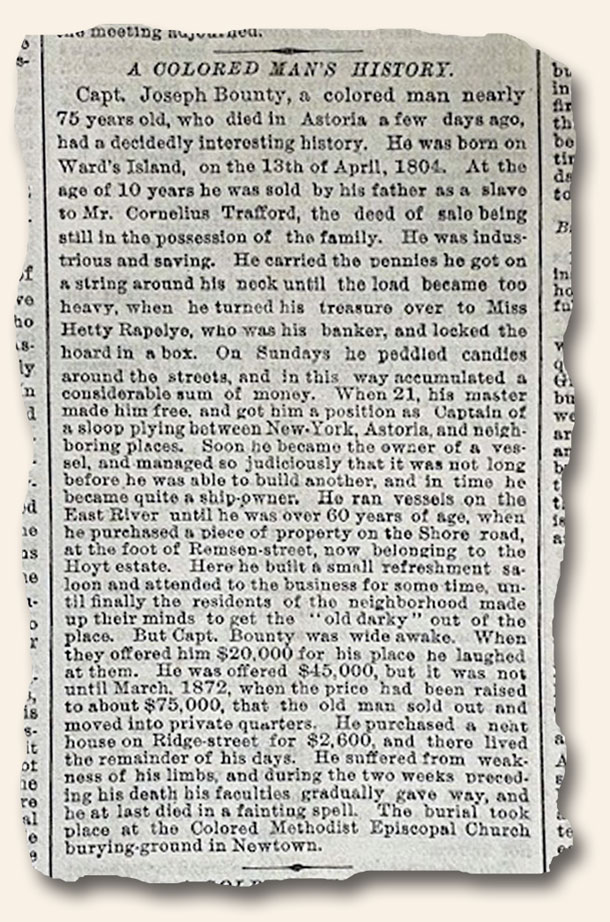
Snapshot 1864… Confederacy’s fight – for independence or slavery?
December 20, 2021 by GuyHeilenman · Leave a Comment
In grade school back in the 1960’s/1970’s I was taught that the Civil War was fought between the Northern (Yankee) States who wanted to free the slaves and the Southern States (Confederates) who wanted to keep the slaves in bondage. Bad Southerners! Perhaps if I had been born in The South my education would have been bent in a different direction, but through my teenage years I assumed this was the accepted “truth”. When I moved on to college… and then graduate school, my assumption of such a simplistic view was challenged by my enlightened (now I think they would be called “woke”) professors who informed me of the true reason: The Southern States merely wanted to exercise their right to self-government (i.e., “State’s Rights”)… to not be controlled by a federal government whose reigns were largely in the hands of the Northern States and their own interests… the right to separate (succeed)., while the Northern States wanted nothing more than to preserve The Union (largely for selfish reasons). Bad Northerners!
Of course I now know the reasons were varied and complex, but by far the most important result was in fact the Emancipation of enslaved blacks. After all, how could “We The People” possibly stand the test of time without embracing (to the core) the self-evident truth that “all [people] are created equal, that they are endowed, by their Creator, with certain unalienable Rights, that among these are Life, Liberty, and the pursuit of Happiness”?
However, I digress. Circling back to the divergent views I was taught…
As I was perusing a Sacramento Daily Union (Nov. 3, 1864), the heading of a front-page article caught my attention: “The New Agitation in the South – Slavery as Well as Separation the Ultimate Object of the Rebellion”. It turns out that while revising history to meet a specific narrative may be the order of the day, the historical perspective regarding this particle issue may not be a victim of these Orwellian efforts. The article (in full) is as follows:
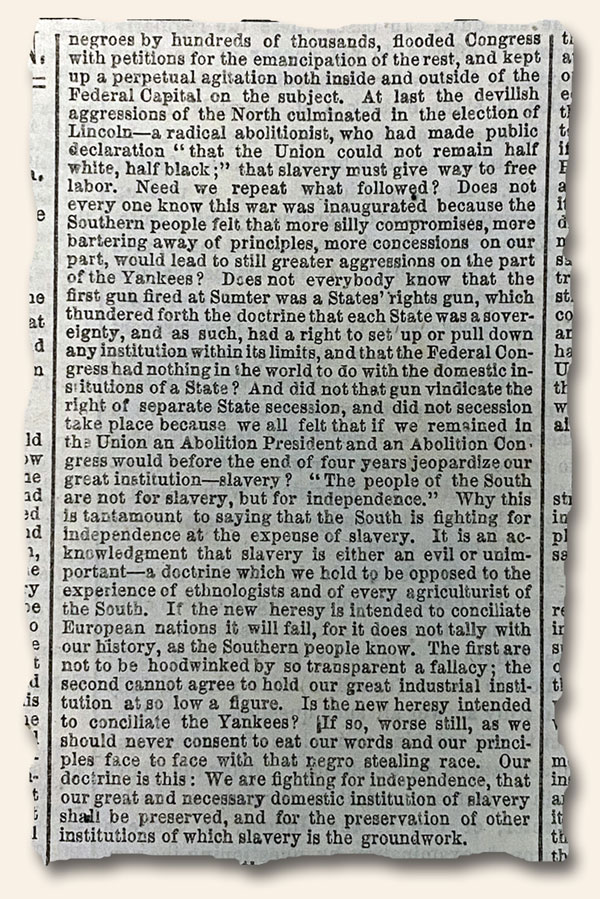
William Cowper speaks out against slavery (1791)… They put it in print…
February 25, 2021 by GuyHeilenman · Leave a Comment
Thank goodness “cancel culture” did not exist (at least in [Wilbur]force) back in 18th century.
Flashback to the late 17oo’s… Although slavery had been part and parcel of many cultures for thousands of years, and was certainly woven throughout all aspects of life and commerce in Great Britain, some were staunchly against the practice and had the courage to fight for those whose skin color did not match their own. One such person who was particularly outspoken in this regard was the popular and well-respected poet/hymnologist William Cowper. Although taking such a stand was both an affront and a danger to the political and social mores of the day, he (and others with similar convictions) were permitted to speak, and in the long-run, the world’s view was eventually transformed. How do we know? They (actually) put it in print!
The following excerpt from one of his anti-slavery poems was printed in the Columbian Centinel dated June 16, 1791: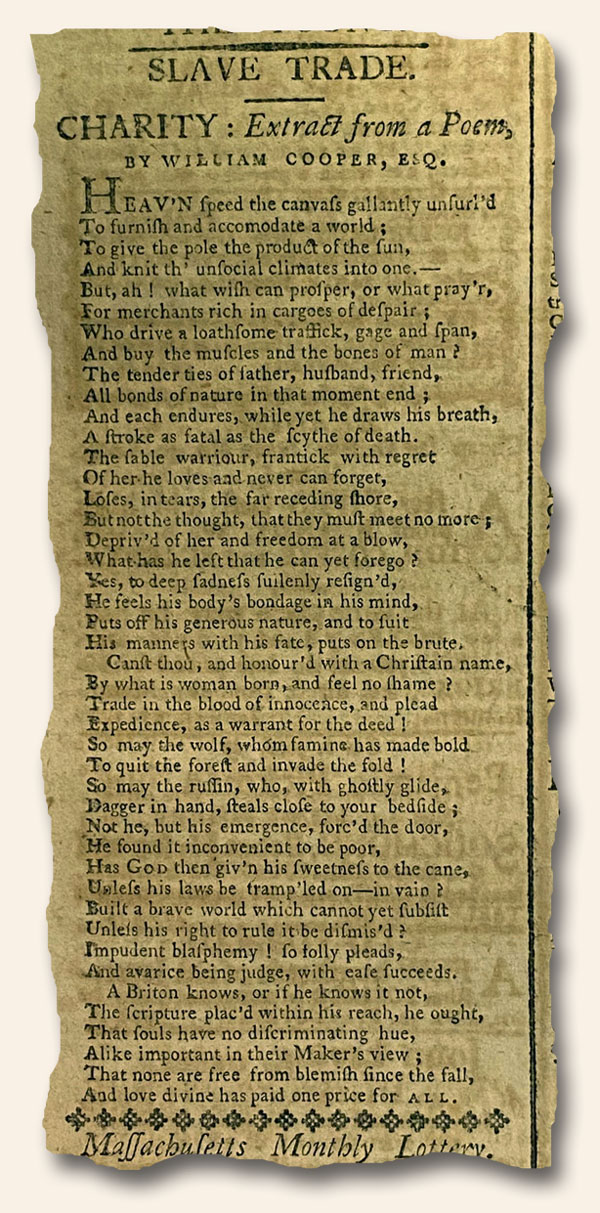
Snapshot 1863… A slave mother’s attempted escape…
January 11, 2021 by GuyHeilenman · Leave a Comment
We recently discovered a heart wrenching account of a slave mother’s attempted escape with her child on an inside page of a New York Tribune dated January 29, 1863. Editorializing on my part will not do it justice. It is accounts like this one, which were part of everyday life for many who were living in bondage, is a continual reminder that I will never be able to comprehend what it’s like to walk in the tattered shoes of a slave.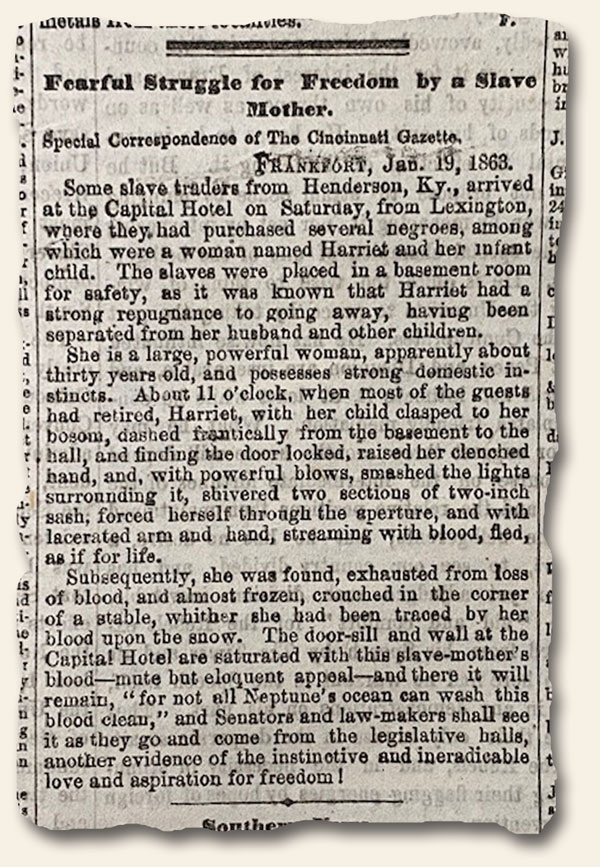
Snapshot 1807… William Cowper and the Slave Trade…
October 22, 2020 by GuyHeilenman · Leave a Comment
We recently discovered a Gazette Of The United States, For The Country (Philadelphia), dated May 25, 1807 which had a timely reprinting of William Cowper’s poem regarding the abolition of the Slave Trade – just a few weeks after the enactment of the Slave Trade Act of 1807 (United Kingdom). It would still be another quarter-century before slavery within the Britain Empire would be abolished. 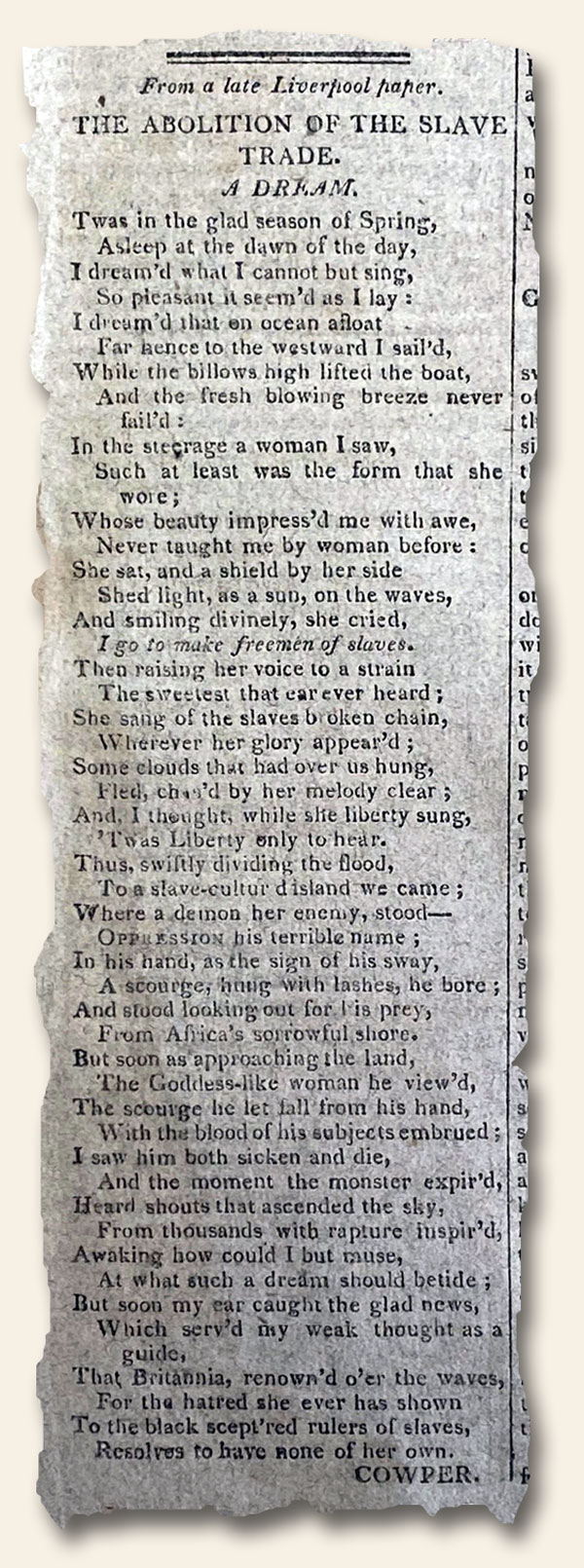
I’m New Here: Week Forty…
December 6, 2019 by Stephanie Williams · Leave a Comment
 At the start of this week, I was a bit hard-pressed to think of something new I learned. Winter dramatically closed the Thanksgiving celebrations in our part of the world, and I spent two days trying to determine the best window for travel within two storm systems. Consequently, I arrived halfway through the day Monday and have been scrambling to catch up with the December crush of orders ever since. Yesterday I decided that this was a good time to reflect on all the things that have become old hat to me, and how much I enjoy the rhythm of this world of old newspapers and the folks that value and collect them. However, the end of the day brought home a new lesson.
At the start of this week, I was a bit hard-pressed to think of something new I learned. Winter dramatically closed the Thanksgiving celebrations in our part of the world, and I spent two days trying to determine the best window for travel within two storm systems. Consequently, I arrived halfway through the day Monday and have been scrambling to catch up with the December crush of orders ever since. Yesterday I decided that this was a good time to reflect on all the things that have become old hat to me, and how much I enjoy the rhythm of this world of old newspapers and the folks that value and collect them. However, the end of the day brought home a new lesson.
A quick search of the internet archive yields a total of 1,355 works that are about Harriet Tubman. Many titles are children’s books, by which young people have learned of Tubman’s many missions to liberate somewhere between 70 and 300 slaves, with heroic disregard for her own precarious freedom. Her name is closely associated with the Underground Railroad, and she is credited with the altered route into Canada in response to the Fugitive Slave Law of 1850.
And yet.
This week we discovered a report of her death in “The Omaha Bee” for March 11, 1913, out of Nebraska. It is outrageously brief, and bewilderingly sparse in its acknowledgement of the North American 1800’s “Moses”.
The following is what Tim wrote for an upcoming catalog listing:
Page 3 has a somewhat inconspicuous report on the near death of the famed Harriet Tubman.
The report is headed: “Aged Negress Friend Of Abraham Lincoln Dying” and reads: “Harriett Tubman, a colored woman 95 years old, who is said to be a friend of Abraham Lincoln and Secretary of State William H. Seward, and who was associated with John Brown in anti-slavery work, is dying here of pneumonia.“
A curiously brief report giving her extraordinary life. A notable that of the many volumes of newspapers in our inventory this is the only report of her death (or nearly so) that we could find.
The new thing I learned this week is that a newspaper can only report on things to which the editorial staff is paying attention, or finding noteworthy. This seems more than a bit disconcerting, but then again I may have had too many Thanksgiving treats.


